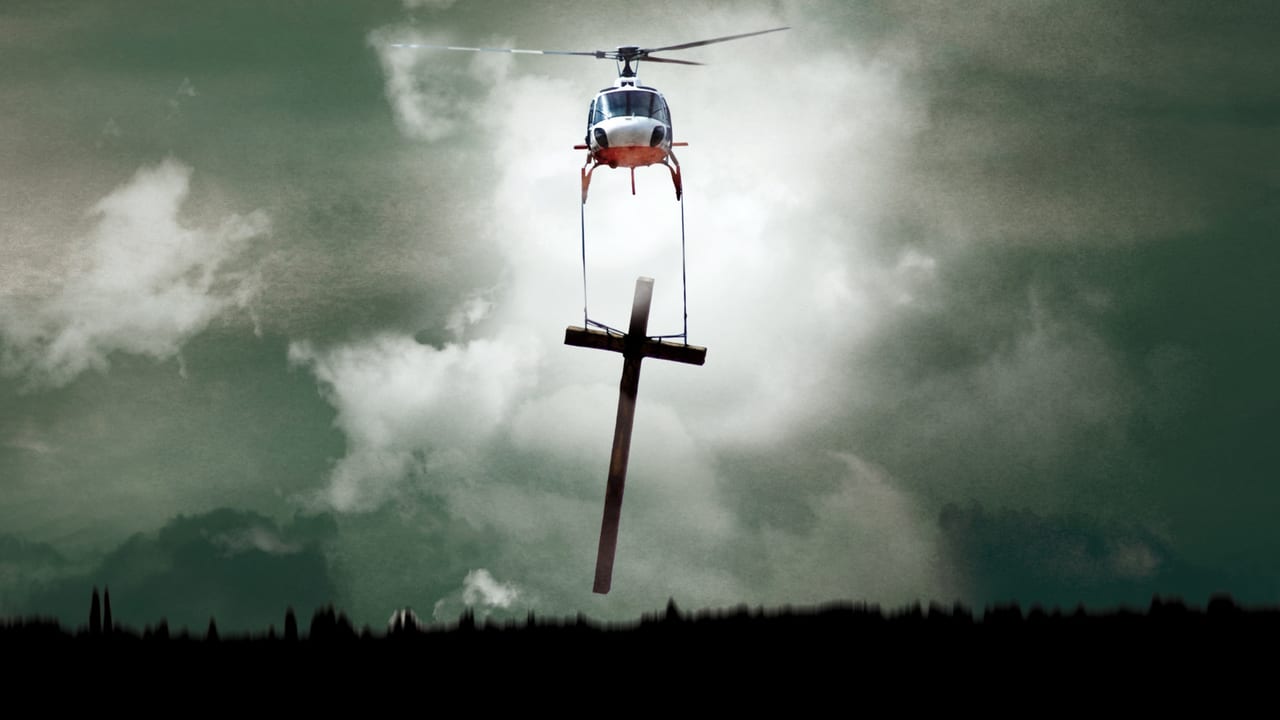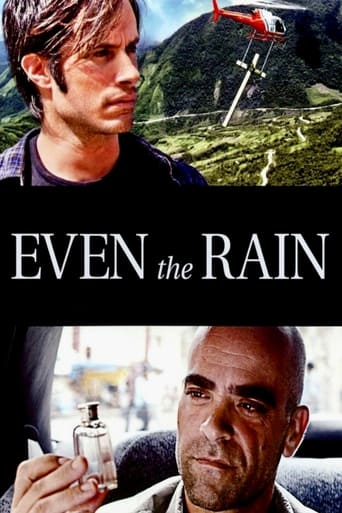



At first rather annoying in its heavy emphasis on reenactments, this movie ultimately proves fascinating, simply because the complicated, highly dramatic tale it tells still almost defies belief.
View MoreThe movie really just wants to entertain people.
The film's masterful storytelling did its job. The message was clear. No need to overdo.
View MoreBy the time the dramatic fireworks start popping off, each one feels earned.
View MoreEven the Rain is a movie inside a movie, that illustrates both problems amongst people both in the present and past. This movie a dramatic plot that kept me on involved in the movie, paired with the great acting of course. I really enjoyed the history side of the movie, as Even the Rain open with the casting of members for the main storyline. In the main storyline, the main focus was on the directing on another movie depicting Bartolomé de las Casas, a priest during the exploration of the new world, North America. Not only did this movie entail a historical storyline, but it also included another which were the people of Boliviá, who were fighting police that were taking away their water. Thus the movie continued weaving through both stories and creating tension between the leaders of Boliviá, the people of Boliviá, the actors and directors from Spain. This international film, in Spanish, was a very insightful film on both the problems that las Casas faced and present problems that Bolivia's nation faced. With the developing of characters willingness to help each other throughout the film, the film packed a punch. I would recommend this film to anyone, as it has lessons for all who watch it.
View MoreThis film relates something about the privatisation of water in Bolivia and the enforcement of that private ownership by the government. Water, previously owned by the people through their government, then water rights sold to a trans-national corporation by operatives within the government. Lest we think that this sort of thing only happens in the lesser elsewhere, please note the following:A US judge declares Detroit residents have no right to water 1 October 2014In a ruling on Monday, the federal judge overseeing the bankruptcy of Detroit declared that workers, youth and retirees have no "fundamental right" to water, as he threw out a lawsuit challenging the city's policy of shutting off tens of thousands of residents from one of the most fundamental necessities of life.
View MoreI do like Ken Loach's film, being a regular leftie, but they are sometimes a bit 'worthy' and downbeat. This film is right on the money, showing a believable crew making a low budget movie with anti-imperialist intentions showing how Columbus was nothing more than a vicious exploiting thug. I particularly like the way the cast, director and producer are getting on with the job of making a product within a budget and the stress the producer endures when his actors get precious or even more, when his indigenous not so stupid extras get stroppy too. Of course its neo imperialism that raises its ugly head to show that the sins of the past are very much in evidence today as the 'natives' are still fighting for their land and their water against the crushing power of multi national 'free market' companies seeking to expropriate their natural resources with the help of corrupt local politicians. This movie just grew and grew on me as I was aware that it could end in a very bad way. Did it? Well worth the wait. A gripping and visceral piece of drama.
View MoreRarely have i been so hesitant on how to judge a movie - it seems at the same time exceptionally good and rather weak, both with respect to it artistic form and its political content.Regarding the content, as mentioned by several commentators, a guiding theme of the movie is to make you feel and understand in which ways not much changed about the oppression of the South of the world by the North and of First Nations by immigrants to the new world; and even more importantly, that for bettering this, it's not enough for the average European to just be good and help the poor, because that merely leads to the paternalistic and condescending behaviour shown by the film's protagonists towards their indigenous workers. In short, the depiction of the dialectics of oppression, privilege and solidarity - in particular the voluntary, cheap, incomplete kind of solidarity - is relentless and far above average.On the other hand, the supposed topics of the movie are hardly even touched: I learnt a lot more about the Cochabamba water war from the user comments here on IMDb than from the film itself, it doesn't really explain what that war was all about. There is a bit more material about Columbus, De las Casas and their time, but it's all fragmentary, symbolist, and doesn't form a coherent picture, as it would be needed to really understand anything about history.Regarding the artistic form, i'd call this "Epic Theatre" in the Brecht'ian sense, as flabbergasting as that may seem in our post-modern times: Not only by the fact that the plot of the movie is "turning a movie", but by many other details as well, the spectator is frequently made aware the s/he is watching a play. To name just one example: People read from historical letters, then actually go on to comment why they read from those letters, and propose interpretations of the text, just like Brecht's chorus. Or imagine, in a movie, actors telling the stage director: "There are more important things than turning a movie" - and walking away from the scene. Fragmentation techniques, interruptions, contrast and contradiction, all these defamiliarizing elements of Epic Theatre abound, and even elements of the typical simplistic and abstract scenic design can be found in some parts of the movie in the movie. The overall effect is intense, this is certainly exceptionally artful, very unusual and worth seeing. Unfortunately, there are several artistic defects as well. Most of the characters are rather schematic and not very convincing, in particular in their change and development, and some turns of the plot seem contrived and artificial. Even worse, the Epic elements are not used for their proper purpose, which is making the audience think, deeply understand the social conditions at hand, and critically reflect them. Sure, the alienating effect is sufficient to make you aware that you are watching an explicitly political movie - but as i said, information is missing to really understand and reflect the alleged topics. You are merely left in diffuse indignation about the injustice of the world, with some equally vague hints that it's both possibly to individually oppose and collectively fight injustice. That alone is not news, really; the depiction of both options is neither very convincing nor in any way specific.Altogether, i deem the movie far from perfect as a work of art; but it is so diverse in its content and form that there are certainly many ways to view it, and more than one aspect that's worth seeing. Thus, i recommend you see for yourself, i don't think your time will be wasted.
View More